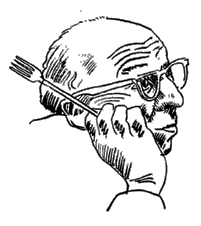My Dinner with Aaron
On a recent Friday afternoon, I stopped at the Pietisten office on my way home from work. Phil Johnson, editor-in-chief, poured two cups of coffee and we sat down to take stock of things. Phil said, “I have a favorite composer.” This was unexpected, but since I work in the concert business my antenna went on alert. “Who? No wait. Let me guess. Is it someone from the 20th century?” “Yes.” “Shostakovich?” “No.” (That was good, since Hawkinson had already claimed him as a favorite.) “Well, who?” “Copland,” Phil blurted out and went on to say: “The other day I was in a traffic jam and I heard El Salon México on my car radio. I didn’t even mind being stuck because this music was so beautiful. I also like Appalachian Spring and Billy the Kid.” This was indeed news. Aaron Copland is first rate. Not Mozart or Beethoven but definitely major league. “Did you ever see him in person?” Phil asked me. Well, I had.
Once, about twenty years ago, the Saint Paul Chamber Orchestra organized an Aaron Copland festival and lured Cop-land out of New York to Minnesota. It was a big success. Wewere starved. We hadn’t really had any big gun composers in Minnesota since Dvorák vacationed in Spillville, Iowa before the turn of the century and came up to look at Minnehaha Falls.

While Copland was in town, the University of Minnesota invited him over to their Music School on a free night to conduct a master class. I attended this class, and it had been arranged that I would give Mr. Copland a ride back to his hotel. When the class was three-fourths over he whispered to me that he wanted to leave. So we sort of slipped out, gestured like he wasn’t feeling too well, walked to my car, and headed east on highway 94 toward the St. Paul Hotel.
After we crossed the Mississippi River, I asked him if he had had dinner. “No.” “Would you like to stop at a restaurant?” “Great,” he said, perking up a bit. “What do you have in mind?” He probably wasn’t tired, but just had that itch to get out of someplace (a tedious master class) that can overtake one. I suggested the Lexington, a Saint Paul institution known for its steak and seafood, with walnut paneling and pink linen tablecloths. We were seated at about 10 pm, yet he seemed to be in no hurry, ordering an aperitif and some wild rice soup, then an entree, salad, dessert, coffee and even a glass of port.
During this two-hour meal I asked Copland the questions he had no doubt heard many times — about his youthful studies in Paris with the legendary Nadia Boulanger, about Leonard Bernstein, the New York Philharmonic, serialism, music education and where future audiences for classical concerts were going to come from. Did he have any interesting young performers to recommend for the concerts I was starting to cook up in St. Paul? What were his favorite works? Composers? Other interesting musical events, memories…all these questions the urbane Copland answered with great style and a dry humor. My glass of port, and the passage of twenty years, have allowed some details—the precise phrasing—of these responses to evaporate. One underlying theme was Copland’s position that although he loved the great masterpieces of the repertoire he could easily live without them if they only came at the expense of listening to interesting new music.
He seemed to like the core intent of my own work (which was commissioning music and promoting solo recitals), and he strongly encouraged me. I had a small paperback edition of his book, What To Listen for in Music, which he autographed: “After a scrumptious meal. Gratefully, Aaron Copland.” Just after midnight I drove him back to his hotel, very pleased to have spent this time with a wonderful American composer whose centennial anniversary we now celebrate.
